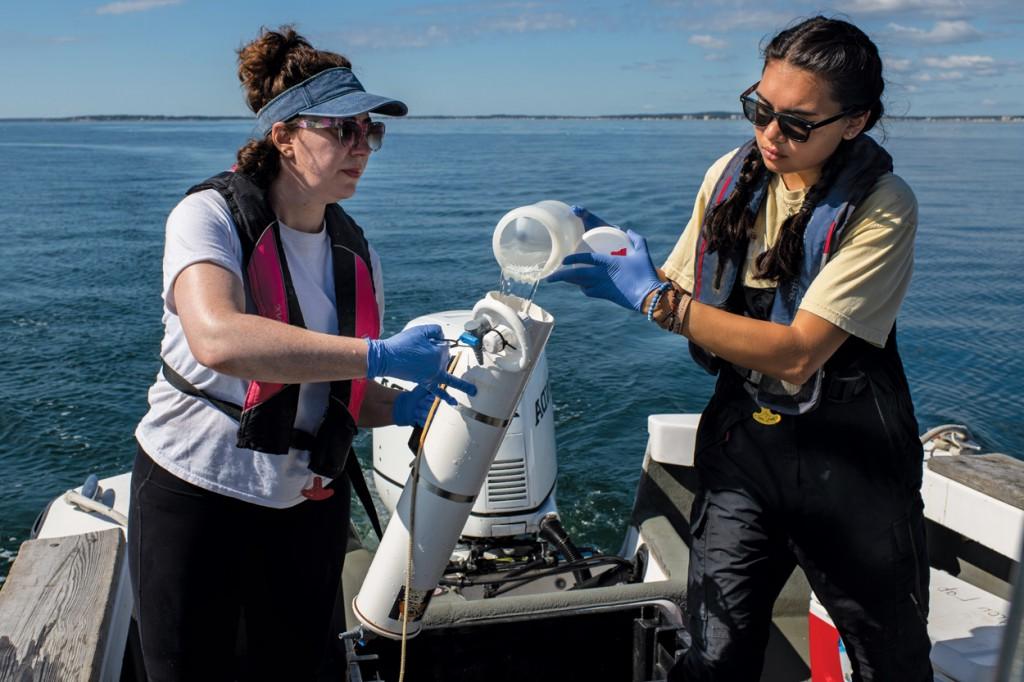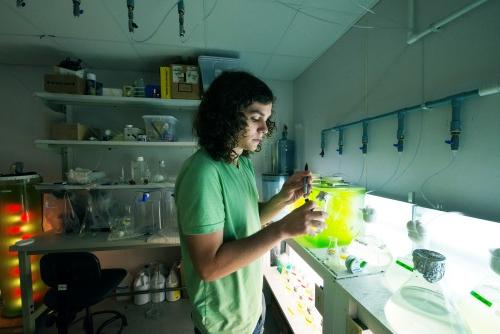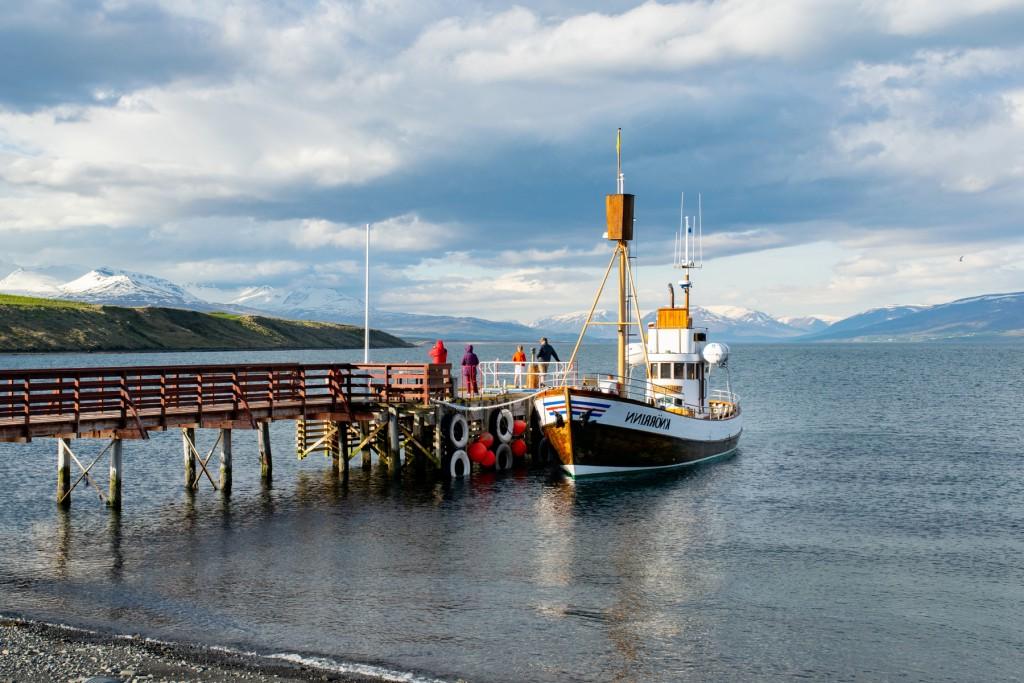Make Waves With an Aquaculture Degree from UNE
Imagine you’re at a job interview for a position in the aquaculture field, and you’re able to say that you’ve not only studied kelp farms but have also helped a kelp farming operation.
This is the edge that UNE’s B.S. in Sustainable Ecological Aquaculture (SEA) gives you. From day one, you will work with aquaculture industry experts and study on a campus with the Atlantic Ocean in its backyard. You will be immersed in four years of hands-on, on-the-water activities that prepare you for exciting jobs in aquaculture. There will never be a dull moment while taking a class from one of our SEA professors.
Our Sustainable Ecological Aquaculture degree program prepares you for the aquaculture industry. You will be armed with the knowledge and unique skills needed to culture organisms in the nearshore coastal environment for food or restoration with special emphasis on sustainability, societal values, needs, and policies.
Study Sustainable Ecological Aquaculture on the Gulf of Maine
Why UNE for a Sustainable Ecological Aquaculture Degree
With the ocean just feet from our campus, UNE offers a truly unique experience to Sustainable Ecological Aquaculture degree majors. Benefits of our SEA program include:
- Gain skills for the aquaculture job market through abundant hands-on experience out on the water
- Work and learn on our University-operated kelp farm, private island, and partner aquaculture sites
- Build nautical skills on UNE research vessels
- Learn at the state-of-the-art Girard Marine Science Center with recirculating aquaculture system
- Enjoy proximity to Portland’s working waterfront
- Take advantage of internship opportunities all four years with area industry partners
- Learn from expert faculty
- Join a supportive community of students and faculty who share your passion for the ocean
What Will You Study? Sustainable Ecological Aquaculture Program Curriculum Overview
UNE offers a common set of marine-based courses in the first two years of our marine programs, allowing you to switch easily between marine majors. Once you are settled in the Sustainable Ecological Aquaculture major, here are some of the courses you can look forward to:
- Systems Thinking and World Problems
- Aquaculture Policy and Management
- Ocean Aquaculture Design and Operation
- Marine Operations – Boating and Water Safety
- Ocean Foods Systems Seminar
Meet Chris, Aquaculture ’22
An aquaculture major interning at an oyster farm in Georgetown, Maine, Chris is learning — hands on — how to raise a sustainable, renewable protein source with the goal of starting his own oyster farm.
Potential Jobs in Aquaculture
UNE students are prepared for careers and graduate school. In fact, 95% of our undergraduates are employed or enrolled in higher education within one year of graduating.
With our Sustainable Ecological Aquaculture degree, you will gain the tools and experience needed to design, manage, and operate:
- Ocean-based fish pens
- Kelp aquaculture sites
- Bivalve sea farms
You will also gain an understanding of ocean-based aquaculture policies and regulations and the management skills needed to run both small and large sea farms. You will graduate from this program with a resume that is sure to land in the “keepers” pile of any employer in the aquaculture industry.
Sustainable Ecological Aquaculture degree majors may explore a wide variety of aquaculture jobs, including:
- Manager of farm lease applications and permits
- Sea grant extension agent
- Market development specialist
- International relations specialist
- Ocean farmer (including oyster, finfish, and kelp farming)
average annual salary of an aquaculture manager in the U.S.
(Recruiter.com)
Career Advising in the Sustainable Ecological Aquaculture Program
Whether you have a specific career goal in mind or a vague idea of the field that interests you, Career Advising is here to help you plan your next step.
Facilities
UNE offers some of the best research, lab, and classroom facilities in the nation for the study of marine science — including state-of-the-art buildings, a fleet of research vessels, and our own research island — and you can access all of them right from our main campus in Biddeford, Maine.
Take a Virtual Tour of the Marine Science Center
Explore all School of Marine and Environmental Programs facilities
Experiential Learning in the Sustainable Ecological Aquaculture Program
Student Clubs in Sustainable Ecological Aquaculture
Our student clubs compliment the hands-on learning experiences you will enjoy in the classroom. Organizations include:
- Aquaponics Club: The Aquaponics Club provides learning and leadership opportunities within the School of Marine Programs’ student-managed aquaponics lab. The club is responsible for the establishment and maintenance of systems within the lab space and for tending to the fish and plants the systems are centered around. Club members receive hands-on experience with the plumbing and infrastructure required for recirculating aquaculture systems, as well as IACUC training on how to properly care for the fish in the system in compliance with federal regulations. The club’s efforts culminate in the display of edible plants at the living wall in the commons and in the Edible Campus Markets held twice a year to augment the UNE Sustainability Office’s Edible Campus Initiative.
- Aquarium Club: You will have the opportunity to learn and take care of fresh and saltwater tanks and learn about different species of fish and how to look after an aquarium. Select students are chosen by the advisor to help with care and maintenance.
- Marine and Environmental Programs Club: Become more involved and familiar with the Marine and Environmental Programs at UNE by connecting with both faculty and other resources. Upperclassman marine and environmental programs students will connect with new/underclassman marine and environmental programs students, meet and connect with professors to learn about research opportunities, learn about internships/job opportunities, build resumes, become familiar with all aspects of the marine and environmental programs, learn more about resources available, such as tutoring, and host events/community service projects related to marine and environmental programs.
Internships in the Sustainable Ecological Aquaculture Degree Program
The real-world experiences you gain when you’re out on the water with classmates, completing internships with our industry partners, or conducting research with our faculty provide the hands-on skills you need to immediately jump into the ocean-based aquaculture industry after graduation — and thrive.
Nearby Portland, Maine, the epicenter of sea aquaculture in the state, provides numerous internship possibilities. Aquaculture businesses in Maine are undergoing rapid growth, which means more opportunities for our students to intern — building valuable career connections.
Possible internship sites include:
- Atlantic Sea Farms
- Bangs Island Mussels/Wild Ocean Aquaculture
- Eros Oysters
- Heritage Seaweed
- Maine Oyster Company
- Maine State Aquarium
- Nordic Aquafarms
- Saco Salmon Restoration Alliance and Hatchery
- Spinney Creek Shellfish
For more information email the Academic and Career Advising Center at advising@yilunjianshe.com.
partner companies and organizations offering real-world experiences to our Marine students

Sustainable Aquaculture Research Opportunities
UNE provides a breadth of research opportunities not commonly offered to undergraduate students, and you’ll always work with a faculty member. From studying the safety of edible seaweed, to exploring the ecosystem services provided by ocean farming, there’s a research project with your name on it.
In addition to classes and faculty lab positions, UNE students have access to fellowship opportunities from partners such as Bristol Seafood and SEANET, as well as programs like UNE’s Summer Undergraduate Research Experience.
Research Areas
The field of Marine Science is as broad and diverse as the vast oceans that cover most of our planet. At UNE we touch upon all facets of marine science with special focuses in the following areas of research.
Applied Marine Technology
Applied marine technology is a crucial Marine Programs research area that cuts across all others. Robotics, research vessels, remote and autonomous underwater vehicles, environmental monitoring, and modeling are all vital tools that enable modern marine research to occur. Researchers in this area are interested in innovations in and novel applications for marine technology.
Biology of Marine Organisms
Our Marine Programs faculty and professional staff conduct a wide range of research in the areas of biology and ecology of marine organisms. This research area is very broad and ranges from marine genetics to the migration patterns of large animals like sharks, seals, and whales. From seaweed to sharks — plankton to pinnipeds (seals!) our team covers it all.
Food from the Ocean
With a global human population headed towards 10 billion by 2050, understanding the interactions between the ocean and what we eat is more important than ever. Our location on the coast of Maine has a deep heritage and connections to the people and communities who have harvested food from the sea, and the ecosystems that provide it. We have robust research and education programs in this focus area including fisheries science and management, ecological aquaculture, marine entrepreneurship, migration of highly migratory species, and food web ecology.
Human Impacts on the Ocean
Evidence of human impact on the ocean is everywhere, not just limited to our coastal oceans. Plastics and chemicals have been documented from the deepest depths of the global seas, while climate change affects all aspects of the ocean. More and more, we cannot separate studying the natural ocean environment apart from human influence. Fisheries, microplastics, policy, pollution, conservation, and restoration all fall into this category. UNE Marine Programs faculty, professional staff, and students are focused on research and solutions across the spectrum of human influence on our seas.
Global Education
In addition to opportunities to spend a semester abroad in Tangier, Morocco or Seville, Spain for the same cost as studying at UNE's Maine campuses, you may choose to enroll in one of our marine sciences-related travel courses. To enroll in these courses and learn more, visit the Global Education Program website.
Interested in studying abroad? Make a plan with your advisor.
Apply Today







